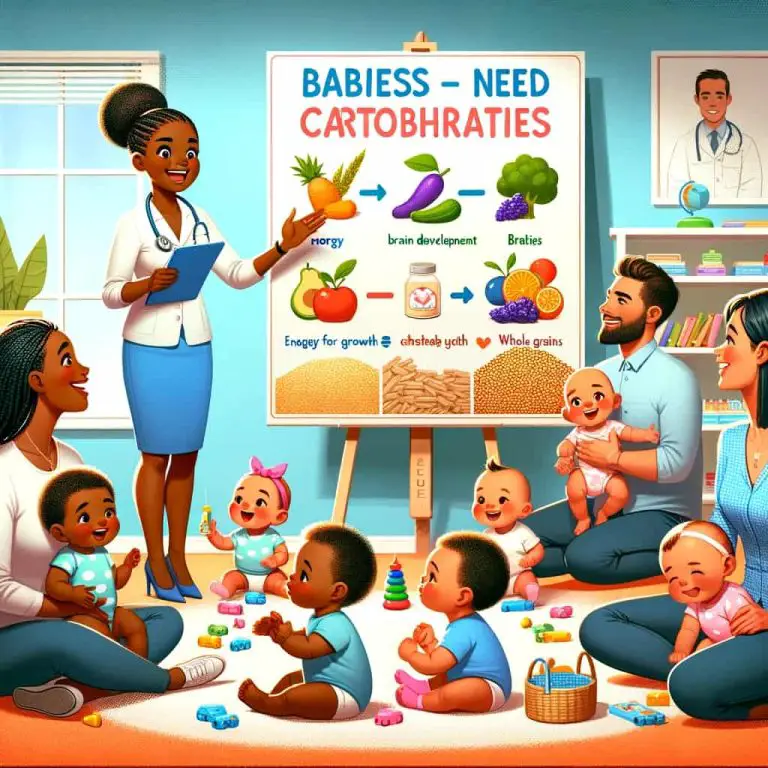How do I know if my child has a vitamin deficiency?

To determine if your child has a vitamin deficiency, look for symptoms like fatigue, weakened immune system, slow growth, and frequent illnesses.
When we think about growing up strong and healthy, vitamins play a big role, just like the heroes in our favorite stories. Just as superheroes have their unique powers to save the day, every vitamin has a special job that helps our bodies work properly. For little ones, getting the right vitamins is especially important because it helps them grow taller, think smarter, and play longer. But sometimes, our bodies might not get enough of these vitamins. This can be like a story where the hero is missing! When our body lacks one or more vitamins, it can cause some problems. We call this a “vitamin deficiency.” It’s a bit like trying to color a picture without all the colors in your crayon box. Some things might not look or work right. That’s why understanding vitamins and making sure kids get enough of them is like making sure all our superheroes are ready to save the day! Being aware of the signs and symptoms, along with regular check-ups and a balanced diet, can help identify and address any potential vitamin deficiencies in your child early on.
The Role Of Vitamins In A Child’s Health
Vitamin deficiencies can impact a child’s overall health, causing various symptoms such as weak immunity, sluggishness, and poor growth. Identifying these deficiencies can be challenging, but common signs include frequent illness, fatigue, and delayed development. Consulting with a healthcare professional is crucial for accurate diagnosis and appropriate treatment.
Vitamins play a crucial role in the overall health and growth of children. They are essential for proper development, strengthening the immune system, and supporting various bodily functions. In this section, we will explore the importance of vitamins for a child’s health.
Keep reading to discover the significance of each vitamin and how their deficiencies can impact your child’s well-being.
Key Vitamins For Children’s Health:
- Vitamin A: Essential for vision, bone growth, and a healthy immune system. It also aids in maintaining healthy skin.
- Vitamin B Complex: Comprising various B vitamins like B1, B2, B3, B6, and B12, they support brain function, energy production, healthy blood cells, and the nervous system.
- Vitamin C: Known for its immune-boosting properties, vitamin C also helps in iron absorption, collagen formation, wound healing, and maintaining healthy gums.
- Vitamin D: Promotes bone development and helps the body absorb calcium. It is crucial for healthy teeth and strong bones.
- Vitamin E: Acts as an antioxidant, protecting cells from damage. It also supports healthy skin and keeps the immune system strong.
- Vitamin K: Essential for proper blood clotting, this vitamin plays a role in maintaining bone health as well.
Signs Of Vitamin Deficiency In Children:
- Vitamin A Deficiency: Night blindness, frequent infections, dry skin, and delayed growth.
- B Vitamins Deficiency: Fatigue, poor concentration, irritability, weakness, and poor appetite.
- Vitamin C Deficiency: Frequent colds and infections, slow wound healing, easily bruised skin, and weakened immune system.
- Vitamin D Deficiency: Weak bones, delayed growth, muscle weakness, and increased risk of infections.
- Vitamin E Deficiency: Nerve damage, muscle weakness, vision problems, and compromised immune system.
- Vitamin K Deficiency: Increased bleeding, easy bruising, and delayed wound healing.
Ensuring that your child receives an adequate intake of vitamins is crucial for their overall health and well-being. Each vitamin plays a unique role in their development, immune function, and various bodily processes. By recognizing the signs of vitamin deficiencies, you can take steps to address them and support your child’s optimal growth and vitality.
Remember to consult a healthcare professional for a proper diagnosis and guidance regarding vitamin supplementation or adjustments to your diet.
Common Symptoms Of Vitamin Deficiencies
Vitamin deficiency symptoms in children can manifest as weakness, fatigue, and frequent illness. Additionally, they may experience poor growth, delayed development, or difficulty concentrating. If you suspect a deficiency, consult a healthcare professional for proper evaluation and guidance.
When it comes to your child’s health, it’s important to be aware of any potential vitamin deficiencies they may have. Vitamin deficiencies can occur when your child’s body doesn’t receive enough of certain vitamins, which are essential for their growth and development.
In this section, we will explore some common symptoms that may indicate a vitamin deficiency in your child.
1. Pale Skin:
- If you notice that your child’s skin appears paler than usual, it may be a sign of anemia due to an iron deficiency. Iron is essential for the production of red blood cells, and a lack of it can lead to a decrease in the oxygen-carrying capacity of the blood.
2. Fatigue And Weakness:
- Chronic fatigue or persistent weakness can be indicative of various vitamin deficiencies, such as vitamin B12 or vitamin D deficiency. Both of these vitamins play crucial roles in energy production and muscle function.
3. Delayed Growth And Development:
- Slow growth or delayed development milestones can be a cause for concern. Vitamin deficiencies like vitamin D and calcium deficiencies can negatively impact bone health and hinder proper growth.
4. Frequent Infections:
- If your child seems to be getting sick more often than usual, it could be a sign of a weakened immune system due to vitamin C or vitamin D deficiency. These vitamins are vital for immune function and help protect against infections.
5. Poor Wound Healing:
- Vitamin deficiencies, particularly vitamin C and zinc deficiencies, can impair the body’s ability to heal wounds. If you notice that your child’s cuts or scrapes are taking longer to heal than usual, it may be worth considering their vitamin intake.
6. Skin Rashes:
- Certain vitamin deficiencies can contribute to skin issues. For example, a deficiency in vitamin B7 (biotin) can result in dry, scaly skin or a rash around the mouth. Meanwhile, lack of vitamin C can lead to easy bruising and skin discoloration.
7. Dental Problems:
- Insufficient vitamin D and calcium intake can have detrimental effects on your child’s dental health. Tooth decay, weakened tooth enamel, and delayed tooth eruption are common signs of these deficiencies.
8. Poor Appetite:
- Decreased appetite or a significant change in eating habits can be a red flag for various vitamin deficiencies. Deficiencies in vitamins B1, B2, and B3 can often lead to a loss of appetite and poor nutrient absorption.
9. Vision Problems:
- Lack of certain vitamins, such as vitamin A, can affect your child’s vision. Night blindness or difficulty seeing in dim light may indicate a vitamin A deficiency. Regular eye examinations are essential in detecting any potential vision-related issues.
10. Behavioral Changes:
- Vitamin deficiencies can sometimes manifest as changes in behavior. For instance, low levels of vitamin B12 may result in irritability, mood swings, or even depression. In such cases, ensuring adequate vitamin intake is crucial for maintaining optimal mental health.
It’s important to note that these common symptoms of vitamin deficiencies can vary depending on the specific vitamin lacking in your child’s diet. If you suspect a deficiency, it’s always recommended to consult with a healthcare professional to determine the appropriate course of action.
By addressing any potential deficiencies, you can help ensure your child’s overall health and well-being.
Causes Of Vitamin Deficiencies In Children
Vitamin deficiencies in children can arise due to poor dietary choices, limited exposure to sunlight, and certain medical conditions. Recognizing signs like fatigue, frequent illnesses, poor growth, and skin issues can help identify if your child has a vitamin deficiency.
Insufficient Intake Of Nutrient-rich foods:
- Inadequate consumption of fruits, vegetables, whole grains, and dairy products
- Limited variety in their diet, focusing on highly processed and fast foods
Picky Eating Habits:
- Selective eating, aversion to certain food textures, colors, or flavors
- Restrictive eating preferences leading to imbalanced nutrient intake
Food Insecurity:
- Lack of access to affordable, nutritious foods
- Insufficient resources, poverty, or living in food deserts
Digestive Disorders:
- Conditions affecting the absorption and utilization of nutrients in the body
- Examples include celiac disease, food allergies, gastrointestinal surgery, or chronic diarrhea
Malabsorption:
- Impaired absorption of vitamins due to intestinal disorders
- Digestive issues like Crohn’s disease, cystic fibrosis, or irritable bowel syndrome
Increased Nutrient Requirements:
- Rapid growth spurts or increased physical activity
- Adolescence, pregnancy, lactation, or recovery from illness
Medications And Health Conditions:
- Certain medications may interfere with vitamin absorption or metabolism
- Chronic illnesses such as kidney or liver disease affecting nutrient processing
Lack Of Sun Exposure:
- Inadequate exposure to sunlight leads to vitamin D deficiency
- Spending less time outdoors or using excessive sunscreen
Exclusive Breastfeeding:
- Breast milk is generally rich in nutrients, but some vitamins may be insufficient
- After six months, complementary foods should be introduced to meet growing demands
Genetic Factors:
- Inherited genetic disorders affecting metabolism or nutrient absorption
- Conditions like phenylketonuria or maple syrup urine disease
By understanding the potential causes of vitamin deficiencies in children, parents can better identify and address any underlying issues. It is important to consult with a healthcare professional for a proper diagnosis and guidance on appropriate treatment options.
Diagnosis And Testing
Wondering if your child has a vitamin deficiency? Diagnosis and testing can help you find out. Look out for symptoms, consult a healthcare professional, and get the appropriate tests done to get a clear picture of your child’s nutritional health.
To determine if your child has a vitamin deficiency, healthcare professionals typically rely on a combination of diagnostic methods and tests. These assessments help identify specific vitamin deficiencies and allow for proper treatment. Here are some common diagnostic approaches:
- Medical history review: Doctors will initially gather information about your child’s overall health, eating habits, and symptoms to assess their likelihood of having a vitamin deficiency.
- Physical examination: A physical examination may help identify signs and symptoms associated with vitamin deficiencies, such as skin pallor, hair loss, or brittle nails.
- Blood tests: Blood tests are crucial in diagnosing vitamin deficiencies. They measure the level of specific vitamins in the blood, providing insights into any deficiencies. Some common blood tests include:
- Complete Blood Count (CBC): This test measures the number of red and white blood cells in the bloodstream, helping detect anemia or other blood-related abnormalities.
- Vitamin-specific blood tests: Doctors may order specific tests to measure the levels of particular vitamins in the blood, such as vitamin D, B12, or iron. These tests can help identify deficiencies accurately.
- Urine tests: Certain vitamin deficiencies, such as vitamin B12 deficiency, can be detected through urine tests that measure chemical indicators associated with the deficiency.
- Dietary assessment: Evaluating your child’s diet can provide valuable information about their vitamin intake and potential deficiencies. Healthcare professionals may ask you to keep a food diary or work with a registered dietitian to assess your child’s dietary habits.
- Genetic testing: In some cases, genetic testing may be ordered to identify certain genetic disorders or mutations that affect vitamin metabolism and absorption.
If you suspect your child has a vitamin deficiency, it’s important to consult a healthcare professional. They can guide you through the diagnostic process and recommend appropriate treatment options to address any deficiencies. Remember, early diagnosis and intervention are crucial for your child’s overall health and well-being.
Prevention And Treatment
If you suspect your child has a vitamin deficiency, there are several signs to look for, including fatigue, slow growth, and a weakened immune system. Consult with a healthcare professional to determine the best prevention and treatment options.
Many parents may wonder how to prevent or treat vitamin deficiencies in their children. Here are some important measures you can take:
- Balanced Diet: Ensure your child follows a well-rounded diet that includes a variety of fruits, vegetables, whole grains, lean proteins, and dairy products.
- Vitamin Supplements: In consultation with your child’s pediatrician, consider adding vitamin supplements to fill any nutritional gaps. However, it’s important to remember that supplements should not replace a healthy diet but rather complement it.
- Regular Check-ups: Schedule regular visits to the pediatrician to monitor your child’s growth, development, and overall health. Routine blood tests can detect any deficiencies early on.
- Sun Exposure: Encourage your child to spend some time outdoors in the sunlight, as it is a natural source of vitamin D. However, ensure sun protection measures are taken to avoid harmful UV rays.
- Limit Processed Foods: Reduce the consumption of processed and fast foods as they often lack essential nutrients and can contribute to deficiencies.
- Fortified Foods: Incorporate foods fortified with essential vitamins into your child’s diet, such as cereals fortified with iron or vitamin B12.
By following these preventative measures, you can significantly reduce the risk of vitamin deficiencies in your child and promote their overall health and well-being. Remember, always consult with a healthcare professional when considering treatment options or introducing supplements.
Real-Life Stories: Parents’ Experiences
Read real-life stories from parents who have experienced vitamin deficiency in their children and learn how they identified the symptoms. Discover helpful tips to determine if your child is lacking essential vitamins and what steps you can take to address the issue.
Parents often share their experiences when it comes to identifying potential vitamin deficiencies in their children. These real-life stories can provide valuable insights and help other parents navigate this often confusing area of health. Below are some common experiences shared by parents and what they have learned along the way:
Story 1: Ana’s Struggle with Fatigue and Poor Appetite
- Ana’s parents noticed that she was often fatigued and had a poor appetite, which led to concerns about her overall health and growth. After consulting with her pediatrician, it was discovered that Ana had a vitamin D deficiency. With the appropriate supplementation and lifestyle changes, Ana’s energy levels improved and her appetite returned to normal.
Story 2: Jake’s Frequent Cold and Flu
- Jake’s parents were concerned about his frequent cold and flu symptoms. Despite their efforts to keep him healthy, he seemed to get sick more often than other children. After thorough testing, it was revealed that Jake had a vitamin C deficiency. With the addition of vitamin C-rich foods and supplements, his immune system strengthened, and his susceptibility to infections decreased significantly.
Story 3: Sophia’s Delayed Growth
- Sophia’s parents began noticing that she was not growing at the same rate as her peers. They were concerned about her overall development and decided to seek medical advice. After various tests, it was discovered that Sophia had a zinc deficiency. With the necessary dietary adjustments and supplements, Sophia’s growth gradually improved, and she caught up with her peers.
Real-life stories like these serve as powerful reminders that paying attention to the signs and symptoms of potential vitamin deficiencies is crucial for our children’s well-being. While these stories are not meant to diagnose or substitute professional advice, they can help parents understand the importance of regular check-ups and open discussions with healthcare providers.
If you suspect your child may have a vitamin deficiency, consult with a healthcare professional to get the guidance and support you need.
Common Myths And Misconceptions
Does your child show signs of fatigue or slow growth? These symptoms may be linked to a vitamin deficiency. Discover common myths and misconceptions surrounding this topic to better understand how to identify and address potential vitamin deficiencies in your child.
Many parents worry about whether their child is getting enough vitamins. There are several common myths and misconceptions surrounding vitamin deficiencies in children. Let’s debunk some of these misconceptions and get to the truth:
- Myth: Only malnourished children have vitamin deficiencies.
- Explanation: Vitamin deficiencies can affect children of all nutritional backgrounds. Even children who appear healthy and well-nourished can still have vitamin deficiencies.
- Myth: My child eats a balanced diet, so they don’t need vitamin supplements.
- Explanation: While a balanced diet is essential, it may not always provide all the necessary vitamins and minerals. Factors such as picky eating habits, restricted diets, or absorption issues can contribute to deficiencies. Consulting a pediatrician can help determine if supplementation is necessary.
- Myth: Children can’t have vitamin D deficiency because they play outside.
- Explanation: Despite spending time outdoors, many children still don’t get enough sunlight exposure for adequate vitamin D synthesis. Factors such as geographical location, sunscreen use, and limited outdoor playtime can contribute to deficiency.
- Myth: My child is energetic and active, so they can’t have a vitamin deficiency.
- Explanation: Energy levels and physical activity are not always indicative of a child’s vitamin status. Some deficiencies can manifest without obvious symptoms. Regular check-ups and blood tests are essential to identify underlying deficiencies.
- Myth: All multivitamins are safe and effective for children.
- Explanation: Not all multivitamins are created equal. It’s important to choose age-appropriate and reputable brands that provide essential vitamins and minerals in the right doses. Consulting a healthcare professional can help select the most suitable option for your child.
- Myth: My child’s symptoms are not related to vitamin deficiency.
- Explanation: Vitamin deficiencies can contribute to a wide range of symptoms, such as fatigue, poor cognitive function, weakened immune system, slow growth, and even behavioral issues. Proper evaluation by a healthcare professional is necessary to determine the cause of these symptoms.
Understanding these common myths and misconceptions can help parents recognize the importance of monitoring their child’s vitamin status. While a balanced diet is crucial, it’s essential to consider individual needs and potential deficiencies. Regular check-ups and open communication with healthcare providers can ensure optimal nutrition for your child’s growth and development.
Frequently Asked Questions For How Do I Know If My Child Has A Vitamin Deficiency?
How Can I Ensure My Child Is Getting Enough Vitamins?
To ensure your child is getting enough vitamins, provide a balanced diet with various fruits, vegetables, whole grains, dairy products, and protein sources. If needed, consult a pediatrician who can recommend appropriate vitamin supplements for your child’s specific needs. Regular check-ups are also important to monitor their overall health and development.
What Are The Most Common Signs Of Vitamin Deficiency In Children?
Common signs of vitamin deficiency in children include weak bones, dry skin, hair loss, frequent infections, and poor appetite. If your child exhibits any of these symptoms, consult with a healthcare professional to determine whether they have a vitamin deficiency and what steps should be taken.
How Can I Improve My Child’s Vitamin Levels?
To improve your child’s vitamin levels, it’s important to feed them a well-balanced diet that includes plenty of fruits, vegetables, dairy products, and lean proteins. Additionally, fortified foods and supplements can help ensure they are getting the necessary vitamins. Consulting with a pediatrician can provide personalized recommendations.
Conclusion
Identifying whether your child has a vitamin deficiency is crucial for their overall health and well-being. By observing common symptoms and consulting with a healthcare provider, you can take proactive steps to ensure your child receives the necessary nutrients for optimal growth and development.
Remember, a balanced diet, supplementation if needed, and regular check-ups are key to maintaining their health and preventing future complications.






